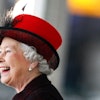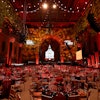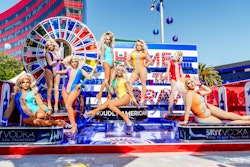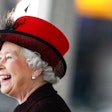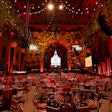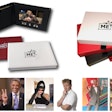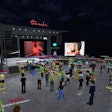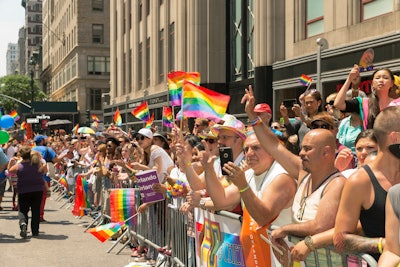
New York is home to one of the largest Pride celebrations in the world, drawing an average of two million people annually. This year, celebrations throughout the month of June will only be magnified as the city hosts WorldPride. 2019 marks the first time a U.S. city has hosted the international event—previous host cities have included Madrid, Toronto, and London. The event also is being held in conjunction with N.Y.C. Pride’s commemoration of the 50th anniversary of the Stonewall riots. Organizers of New York’s annual Pride March and other official events now have an even bigger undertaking, with the addition of an international celebration slated to draw more than four million people and a tribute to the historic moment that served as a catalyst to the gay rights movement. Chris Frederick, executive director of N.Y.C. Pride, spoke with BizBash about what has gone into planning the first World Pride in the U.S., what was learned from changing the Pride March route last year, how the organization plans to commemorate the Stonewall uprising, and more.
When did New York first secure the bid for WorldPride, and when did planning officially begin?
We won the bid in 2015. There was a whole bid process similar to the I.O.C. with the Olympics. There’s a governing body called InterPride, made of various Prides from around the world. Every other year, WorldPride happens. Last time it was hosted was in 2017 in Madrid. We’ve known that we’ve been moving forward with this since 2015. The organization has actually had a committee in place for the 50th anniversary of Stonewall since 2009. In about 2012 or 2013, we began to explore this idea of also bidding for WorldPride because of the fact that it is the 50th anniversary of Stonewall. We really had this in place for about five or six years now.
What were some of the initial goals and priorities organizers had for hosting this event?
We knew we had to honor this important moment for our community. Looking back at the last 50 years and what we’ve accomplished, and what we still need to accomplish, we knew that we had to create the world’s largest and best Pride event that anyone has ever seen. We knew that because of this 50th anniversary, the world was going to come regardless, because they wanted to pay tribute to this important moment in our history.
The 50th anniversary of Stonewall already sets this year’s WorldPride apart from previous editions. How else will this celebration be different?
Each WorldPride is unique to the destination. That’s the beauty of Pride around the world—no single Pride is the same. One thing New York does really well is we’re able to create really massive events in a crowded city. We take over the city in a way that no other Pride can really do. Along with that, I think we’ve successfully been able to grow our programs over the last 10 years. Ten years ago we were doing five events in the last week of June. This year, we’re creating 25 different events and we have 80 official partner events. Overall, there’s a much more super-sized event program roster than what one normally experiences. As a result, we’ve packaged WorldPride as the whole month of June to accommodate all of those different events.
This is obviously a massive undertaking. What challenges have you faced compared to previous years?
We’re creating a lot of new events that we’ve never done before. We’re doing an opening ceremony at Barclays Center and a closing ceremony in Times Square; they’re part of being a WorldPride city. Those are large-scale events we’ve never done before. There’s definitely a learning curve to doing a massive event in the middle of Times Square. With the opening ceremony, it’s our first foray into doing an arena show. Creating events of this magnitude, there’s no recipe as it relates to the L.G.B.T.Q.I.A. community. We’re trying to use what we’ve done in the past and use that expertise to make sure all of these events are as amazing as they possibly can be. But it’s definitely stressful.
Last year, N.Y.C. Pride changed its march route to begin at Christopher Street and work its way up Manhattan. This year, the route has been changed to start at 26th Street and 5th Avenue, ending in Chelsea. What worked and what didn’t work about the route change last year?
Looking back, I’m glad we did it. It was something we needed to suss out to understand how it would work or wouldn’t work for 2019. We approached it much differently this year in the sense that we were very actively engaged with the community, from a community board level to a business improvement district level to the various elected officials in the various districts. And also just hearing from the community on what they thought about the route. The challenge we faced with the route back in 2017 is that this event has become so insanely large that it can’t function with ending in the West Village anymore. The streets are too narrow. Dispersal was always a big challenge because marchers couldn’t get off the route since it was too cluttered. As we prepare for 4.5 million people, we knew we had to spread out the route a bit. This new route extends the actual length of the march, which is something we wanted to accomplish. It allows us to go by typical spots within our city: Stonewall, the A.I.D.S. Memorial, Fifth Avenue. It accomplishes that really well and we’ve had a tremendous amount of feedback as a result.
Along with the Pride March, what other ways are you commemorating Stonewall this year?
We’re doing a Stonewall 50 commemoration rally outside of Stonewall on the anniversary, June 28. Along with that, I think we have a lot of historical components interwoven into all of our programs. We’re launching an initiative where we’ll have displays of the A.I.D.S. Memorial Quilt throughout the entire city, honoring the history of the H.I.V. and A.I.D.S. movement. Our World Mural Project is another initiative we’re working on. We’re painting 50 murals across the city with L.G.B.T. and ally artists, which talk about the history of Stonewall and provide visibility for our community through public art. There are a lot of different ways we’re honoring the movement and making sure people remember where it began.
The theme of this year’s Pride programming is “Millions of Moments of Pride.” What is the significance of this theme and how will it be translated into experiences for attendees?
The theme was adopted back when we created the logo in 2013. It was a different time back then. The community wasn’t facing as many hardships as we’re facing with the current presidential administration. “Millions of Moments of Pride” talks about how we’re looking at all of these collective moments that have made up our history. Whether it’s looking at Stonewall or looking at marriage equality or looking at the fight against transphobia, we’re collectively looking at what we’ve accomplished over the last 50 years, and what more we need to work toward to achieve equal rights. I think that this theme is packaged on the various years coming together for this singular moment that is really historic, and allows us to create a narrative of what we need to accomplish next.
What other Pride events are new or revamped this year?
We’re doing our two-day Human Rights Conference at New York Law School. It’s a conference that speaks to L.G.B.T. issues and human rights issues, domestically and globally. We’re going to have speakers from all over the world coming together to speak on panels, breakout sessions, and keynotes. The opening ceremony at Barclays is hosted by Whoopi Goldberg and has big names like Todrick Hall, Ciara, and Cyndi Lauper. And it’s a fund-raiser for the community. The Ali Forney Center, SAGE, and Immigration Equality will receive grant funding as a result of that event. It’s going to be an amazing charity concert. And then we’ve been doing Youth Pride for three years now. We’re moving that to SummerStage in Central Park. It’s a free Pride event for teens between 13 to 19. It’s always an inspiring place to see that next generation experience Pride in a meaningful way. We’ve tried to create programs that meet all different types of interests because that’s the beauty of our community. It goes back to the breadth of the program that we’ve been able to curate. We feel there are so many events that speak to all different types of interests that you’re bound to find something that speaks to you.
This interview has been edited and condensed.

